Or, if you prefer to read rather than listen, check out the edited episode transcript below!
Mythos are stories with staying power: stories repeated again and again until they’re planted firmly in the collective unconscious.
“Myths derive from the visions of people who have searched their own most inward world. Out of the myths, cultural forms are founded.” - Joseph Campbell
Stories you tell yourself about yourself are no different. These personal history stories become a part of your own mythology and usually remain unconscious. Remember, mythology is the study of culture forming stories, and personal mythology is the study of your own stories that have shaped who you are.
What are your personal mythos?
What are the stories you’ve told yourself about yourself so often that they sink so deep that they’re practically written onto your bones?
These beliefs either propel you toward your desired life or keep you stuck in a stagnant paradigm.
These beliefs can either keep you trapped as a side character in the story of your own life or help you rise to become the hero of your life’s story.
I used to be a side character with the plot happening TO me.
I thought getting out of my corporate fashion career would change that. During my years there, I carved myself into THEIR version of a hero (dressed to kill, sales-focused, and constantly keeping the bottom line and risk mitigation top of mind.)
Then I shifted into career coaching to help people stuck in corporate jobs like me. I wanted to help them find something better.
The problem with that?
I was only helping people find a slightly different storyline. I wasn’t helping people break from being a side character in the modern stagnant paradigm’s storyline.
Our culture makes “the bottom line” the highest priority. But keeping profitability and productivity as the driving forces of life isn’t what being a human is about.
Things like analytics and other stats we can see with our eyes shouldn’t be regarded as facts of life. But for most people who have never questioned our current cultural paradigm, things like job titles, sales figures, 401k’s, annuities, etc., are looked at as not only markers of success but as markers of their worthiness, too.
Only valuing what your eyes can see means that you’re stuck at surface level. But here’s the thing: there’s so much more to you than just what’s at the surface—your outer world is just the tip of the iceberg regarding what’s interesting about you.
With that in mind, it’s time to balance out logos with mythos.
We’re taught to value Logos (reason, logic, analytics) over Mythos (narrative and poetic truth). But you’re more complex than variables to be plugged into a formula.
Our school system teaches us how to regurgitate information and give the one correct answer on a quiz.
When we take this line of logic into adulthood, it can shape the trajectory of our lives if we don’t catch it. What becoming an adult truly means is to take responsibility for shaping your own life. This is what your personal hero’s journey is about.
This doesn’t mean just feeding and clothing yourself; this is about cultivating the courage to make yourself whole after you’ve cut parts of yourself to fit into the cookie-cutter path our society says to take. This means breaking out of the “If I do ‘X’ like everyone else, then that means I’ll be guaranteed ‘Y.’”
Like, “If I get a college degree, I’ll be set as an adult.”
Or, “If I get married by 24 and have kids by 27, then I’ll be ‘on track,”
And, “If I follow the career path my manager gave me, that means I’ll be promoted regularly, and I’ll be progressing in my career and set for life.”
The problem with the “X then Y” types of statements is that the power to choose the direction of your life is in someone—or something—else’s hands, like your boss’s hands, or your parent’s, or your degree/career’s hands. Simply put, it’s as though you’re saying, “I’m not capable enough of living the fullest expression of my one life on my own; I need someone else to tell me what to do with it.”
It’s no surprise why so many of us have this “X then Y” type of thought pattern! We’re wholly dependent on our caretakers, teachers, and mentors for DECADES, then the instant we turn 18, we’re supposed to be functioning and totally independent adults. To make matters worse, our culture encourages us to get married and reproduce only a few scant years after “leaving the nest.”
How often do you see a young person on social media in their early 20s graduate college, get married almost immediately after that, and then have their first child within a year? That example person has literally spent the majority of their life depending on their parents, caretakers, etc., blinked then turned into the parent and caretaker for a child that will be wholly dependent on them in turn for decades? Talk about a vicious cycle!
No wonder why we crave external validation as adults. In school, we’re taught to regurgitate information on command, produce the correct answer in school, and not let our thinking deviate from what the standardized tests say.
Those same teachers, parents, and caretakers (who themselves are products of this standardized thinking) begin to pressure you to find a “safe” career path—aka one that makes the most money in the safest way possible. Individual creativity and deviation from the standard path are discouraged—too risky! Thus, the cycle continues.
If we don’t catch this unconscious way of thinking, it runs the trajectory of our lives. The stories we tell ourselves about ourselves and about the world revolve around this “X then Y” style of thinking.
“I can’t leave this relationship even though I’m miserable, I’ve been with them for too long, and I’ll end up alone.”
“I can’t quit my job and start my own business, I don’t have a degree in it, and I’m too old/young to do something different anyway.”
The answer to getting out of this style of thinking?
Rewriting Myth
Mythos are stories with significant meanings repeated so often that they sink into our collective unconscious. The same goes for stories you tell yourself about yourself. So, if we want to change these stories into something you choose: stories that make you proud of yourself, stories that support you as you create a life you love by your design, then you need first to be able to see the current personal mythology that runs your life, that led you to this moment.
You have to see the stories that shaped you and your beliefs: both personal and cultural. It’s not just the stories about your past failures, accomplishments, and experience that make up your personal mythology, but also the inherited cultural stories, too. What stories did your caretakers tell you as you were growing up? What were the characters in these stories that look you were able to accomplish? What were their inherent limitations? And how did that inform the way you view yourself in relation to the rest of the world?
An example:
As a young girl, I grew up Catholic and heard the Judeo-Christian story of Adam and Eve multiple times. Adam was lonely and created Eve. Then Eve was tempted to eat the forbidden fruit. She was weak and gave in to temptation, but not before she took Adam into sin. Adam, Eve, and their descendants were punished forever: men would have to work hard for food, and Eve would suffer in childbirth.
This is a super simplified version of the story, but these essential story elements make up the tales I was told. As a young girl, I was taught that essentially everything wrong in the world was women’s fault and that we (as women) were always trying to make up for Eve’s sin. It’s no wonder why as a young adult, I bent over backward in my career, pouring my literal blood, sweat, and tears into my job. Whether I was conscious of it or not, this Christian mythos was repeated so often to me that the story's morals sank into my bones, coloring my view of myself, the world around me, and my place within it.
When I finally addressed how the morals of this story and other stories played unconsciously in the back of my mind, I could see how they informed my daily decisions.
It was as though these stories were putting up guardrails for the direction of my life, keeping me on one trajectory whether I liked it or not. Like a bowling ball going down a lane with the butterball rails up, I kept my life in one direction my culture decided for me, but one I didn’t like.
But things drastically changed when I decided to rewrite this myth and change its morals into something that worked better for me. Instead of seeing Adam and Eve as two separate people, I see them as two aspects of my psyche or as archetypes that live within me. What if the story's moral isn’t how these two people (who were supposed to be made in the image of God) went against god? Rather, if these two elements are divine, then integrating them would bring me closer to divinity. What if learning to blend masculine and feminine energy (both energies are present in all humans) was the point of this story?
I don’t mind if a theologian disagrees with how I rewrote this myth. Because at the end of the day, this act of Rewriting Myth helps me. How this myth is rewritten is now a part of my personal mythology, guiding my decisions. I know that when my masculine and feminine energies are blended and balanced within me, I can make more sound decisions that positively impact me and my future.
There are COUNTLESS examples of stories we can apply this methodology, and we’re just getting started! You are a complex creature comprised of multiple (and sometimes conflicting) stories that make up your personal mythology. And just like mythology (the study of myths), we will examine them together, and you will have the choice to see if you want to Rewrite Myth, too.


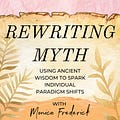





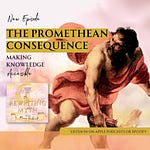

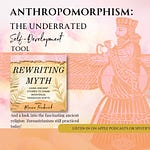
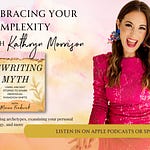

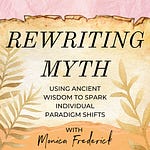
Valuing Mythos over Logos